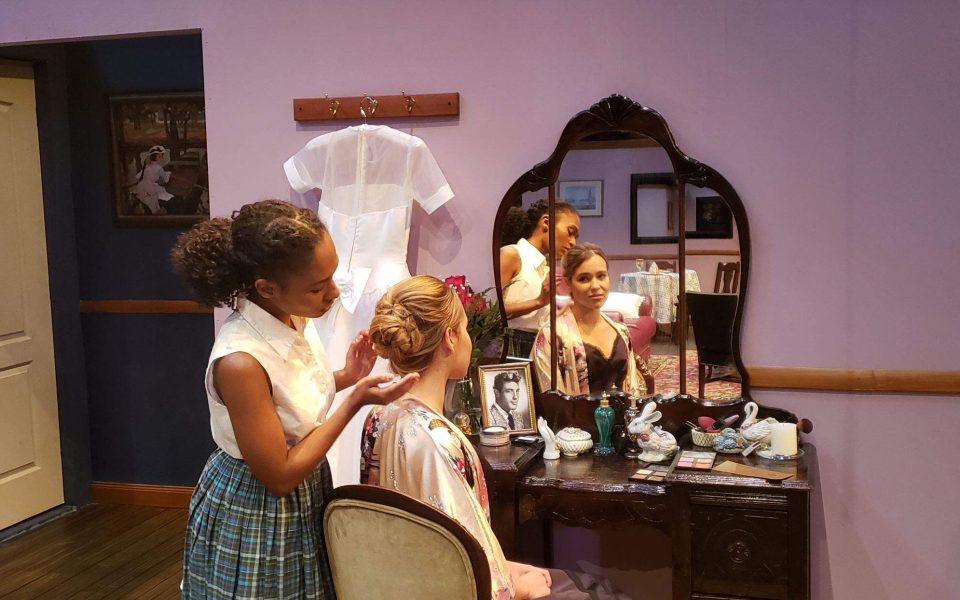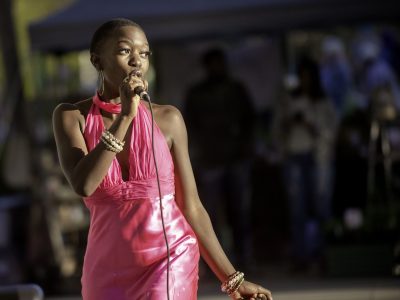The lights don’t go up in a traditional sense, as most of the audience is watching the show on a screen. But as soon as the video starts, they can see a large living room. The walls are painted blue and purple and a vanity to the right boasts a number of makeup products, including a skin-lightening cream. On the other side of the stage is an old radio; it will broadcast news of the Civil Rights movement throughout the show.
Freedom Summer, written back in 2018 by playwright Cynthia Grace Robinson, streamed this past week as part of Appalachian State University’s Summer Festival. The show is based on Robinson’s short play “Peola’s Passing” and takes elements from the writer’s own life.
A red-leather couch sits center stage in front of a door through which Carrie, played by Nikyla Boxley, will re-enter her sister’s life. Nora, played by Mariah Guillmette, is decidedly unappreciative — and fearful — that her sister came all this way.
Both girls are Black, but Nora has decided to pass as white for the last two years, a privilege afforded to her by her light skin. Carrie, meanwhile, plans to leave Nora’s place and head straight to Ohio to join the Civil Rights movement. The play is in the same vein as Nella Larson’s Passing and, more recently, The Vanishing Half by Brit Bennett. They playwright, Robinson, had told the cast early on that her aunt, a light-skinned Black woman, had very different privileges than her mother, who was darker.
In the play, Nora, afraid that she will be found out, tries to convince her sister to stay in their hometown with their mother. Meanwhile, Carrie argues that there will be nothing for her in Jackson, Miss., where the two women grew up, unless she fights for change.
“It was hard coming into the room some days when we were working on some of the longer monologues to the end of the acts,” says Nikyla Boxley, who plays Carrie. “Some of the things that Nora says to Carrie, it was hard to go through every day. I would remind myself that this is a play, not real life, but it was still hard to put myself in that position.”
The show, which was put on by the National Black Theatre Festival, was originally supposed to premiere in March 2020. Though it ended up being postponed due to the COVID-19 pandemic, the play was always going to be online.
“Someone said this the other day when we were doing this talk back,” says Boxley. “People never would have seen this play across the country if we hadn’t filmed it, and this is a story that needs to be told. It didn’t take place that long ago. It’s a great tool, and I can’t wait until one day it’s in a theater somewhere.”

When at last those working on the show were able to film it for an online audience in January 2021, there were still many precautions they needed to take. The set designers were not allowed to be in the same room as the cast and crew, and only the actors were allowed to discard their masks.
“It was crazy, but these rules were important and needed to be followed,” says show director Jackie Alexander. “The small cast helped us quite a bit. It was complicated, but we believed in the piece and knew we could do it.”
The show finally premiered in February before returning to the Appalachian Summer Festival this past week for a one-time showing.
Though the show takes place in the 1960s, the characters touch on many themes that resonate today. The women talk about the intersections of race and class, and the fact that Nora has more wealth available to her by passing as white compared to their mother, who was also light skinned but refused to let anyone think she was not Black.
And just like today, as communities are having more conversations around race and police brutality, Nora recalls that just because white people are marching in the Civil Rights Movement now, that does not mean that these issues are new.
As Carrie mentions, President Johnson has just signed the largest sweeping Civil Rights Act to date into law. At the same time, Black men and Civil Rights workers of different races are dying for justice. Both sisters have a hard time wrapping their heads around this juxtaposition.
“It seemed like she wrote it for [our] time,” Alexander says of the playwright. “I think a lot of people were open to it because of that.”
Join the First Amendment Society, a membership that goes directly to funding TCB‘s newsroom.
We believe that reporting can save the world.
The TCB First Amendment Society recognizes the vital role of a free, unfettered press with a bundling of local experiences designed to build community, and unique engagements with our newsroom that will help you understand, and shape, local journalism’s critical role in uplifting the people in our cities.
All revenue goes directly into the newsroom as reporters’ salaries and freelance commissions.





Leave a Reply